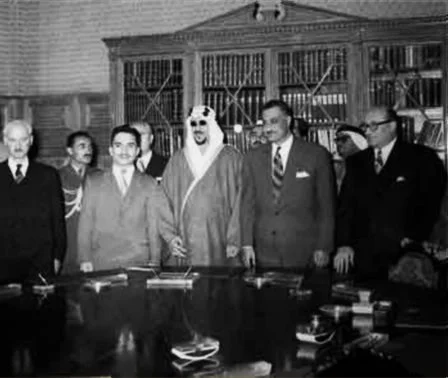domestic Political unrest in sixties’ libya
THE EFFECTS OF PAN-ARABISM
During the early 60’s, the ideological politics of both the Ba’th Party and the charismatic Egyptian leader President Nasser began to have a direct influence on the youth of Libya, and in particular the students, many of whom were now receiving a reasonable education. Also, with many gaining their university degrees in Egypt, they witnessed first hand the doctrines of Pan-Arabism1.
Gamal Abdel Nasser
Photo, CC. Wikipedia.
THE SIX DAY WAR
Things came to a head when during the Six Day War, Israel's attack on Egypt led to the decimation of their military forces and a huge loss of Egyptian lives. This Israeli led action, almost caused a civil war in Libya, with many Libyans regarding the country's relationship with the United States and Great Britain as tantamount to neocolonialism. They demanded that all relationships be severed and all military bases be removed2.
On June 15th 1967, Libyan youths held violent demonstrations in support of other Arab countries at war with Israel. This action sadly led to the death of many Jews and the destruction of properties belonging to U.S and British citizens. During this period many government ministers and officials had left Libya, in fear of their lives and an oil embargo was placed on the United States, West Germany and Great Britain. Libya appeared on the edge of a governmental and social collapse3.
Israeli Tanks Advancing on the Golan Heights, June 1967
Photo, Government Press Office of Israel, Creative Commons, Wikipedia
To try to maintain control, King Idris dissolved the government and appointed a new prime minister, Abdul Hamid al-Bakkoush, which led to the appointment of a vast number of younger highly intellectual ministers. To appease his people, King Idris also donated vast financial amounts towards the rebuilding of Egypt, after its destruction in the Six Day War. A number of other plans were laid out in the hope of overcoming anti-government tensions, this plan included the closure of all U.S and British military bases, the largest of which was Wheelus AirBase in Tripoli. However, the period of relative calm following these measures was short-lived, as for reasons unknown al-Bakkoush resigned after just one year in office. He was replaced by Wanis al-Qaddafi, who was older and was known to have a more conservative approach, which further alienated the government and King Idris4.
Towards the end of 1968, King Idris was thought by many to be failing in his role and with no heir apparent, many factions appeared and sought to overthrow the monarchy. In June 1969, with the realisation of what was about to occur, King Idris left Libya for the final time5.
On September 1, 1969, a young army captain, named Gaddafi, along with a group of army officers known as the Free Unionist Officers Movement, seized power in a bloodless coup d’état, thus ending the monarchy in Libya6.
THE END OF THE MONARCHY IN LIBYA
Anti-monarchy Poster, Downtown Tripoli, 1960s
Photo courtesy of Mike Nemecek
Footnotes
Six Day War. Medium. (n.d.). Retrieved December 2, 2022, from https://medium.com/war-is-boring/tagged/six-day-war.
Public Broadcasting Service. (n.d.). The Six Day War. PBS. Retrieved December 2, 2022, from https://www.pbs.org/wgbh/americanexperience/features/hijacked-wars-threats-responses/
The 1967 War and how it changed Israel. Association for Diplomatic Studies and Training. (2018, March 16). Retrieved December 2, 2022, from https://adst.org/2014/05/the-six-day-miracle-the-1967-arab-israeli-war-and-how-it-changed-israel/
Boyne, W. J. (2022, December 1). The years of wheelus. Air & Space Forces Magazine. Retrieved December 2, 2022, from https://www.airforcemag.com/article/0108wheelus/
Ibid
Johnson, J. K. (2021, February 22). Johnson, Joann K.: 1967-1968 Libya evacuation. American Overseas Schools Historical Society. Retrieved December 2, 2022, from https://aoshs.org/memories/johnson-joann-k-1967-1968-libya-evacuation/



